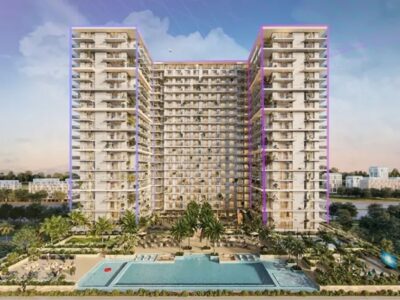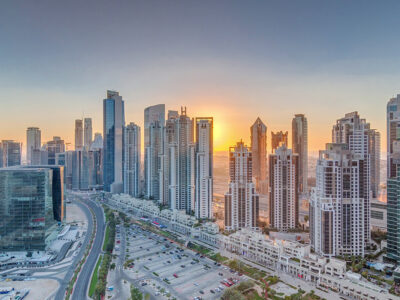Real estate experts encourage Dubai residents to invest in off-plan properties as the city’s population continues to grow exponentially, presenting a lucrative investment opportunity that promises substantial returns for those seeking to maximise their investments.
Off-Plan Manager at Dubai-based real estate agency Betterhomes, Kulwant Khurana, told Arabian Business that now is a “great time to invest in off-plan properties,” but they must weigh the risks.
“Dubai’s population growth serves as a crucial catalyst driving the demand for residential properties. The UAE government has implemented various initiatives to foster population growth in Dubai, attracting a steady influx of individuals,” he said.
Properties managed by Betterhomes are currently experiencing record-high occupancy rates in the emirate, reaching 95 percent for freehold properties and 97 percent for leasehold properties, indicating sustained demand for rentals.
Many, in the past, have shied away from purchasing off-plan properties due to concerns about project cancellations, incomplete developments, and challenges in obtaining refunds.
The current global landscape, marked by high-interest rates and rising mortgage rates, has played a role in making buying off-plan a more lucrative investment opportunity. This landscape has affected the viability of purchasing ready properties, Khurana said.
And despite increased rent yields, the costs associated with servicing a mortgage have increased, resulting in diminished net yields after factoring in all expenses, making the economics of investing in ready properties for returns less favourable.
“Off-plan investments offer a distinct advantage by enabling investors to allocate funds towards properties still available at their original prices. The flexibility of payment plans mitigates the impact of high lending rates, ensuring greater adaptability in managing finances.”

Managing Director of Coldwell Banker UAE, Ayman Youssef, agreed with Khurana’s sentiment.
“Off-plan properties are more investor friendly owing to benefits such as price appreciation, flexible payment plans, [and] attractive offers from developers,” he told Arabian Business.
“They can be booked at a reasonably lower initial cost compared to buying a completed property.”
Exploring Dubai’s off-plan boom
Off-plan is becoming a very popular investment option for many in Dubai. In 2022, property sales in this segment experienced phenomenal growth, accounting for 55 percent of overall sales volume and 56 percent of total sales value.
Dubai’s off-plan property market defied the usual mid-year dip trend and recorded over 10,000 transactions last month, according to Property Finder, indicating that it is currently experiencing a boom. Around AED30.41 billion in real estate transactions were recorded last month, marking the highest transaction volume and value for the month of June in a decade. Off-plan properties contributed over 41 percent of the total transaction value.
The top 10 Dubai districts for off-plan buyers last month included: Dubai Marina, Palm Jumeirah, Dubai Harbour, Dubai Creek Harbour, Dubai Hills, Burj Khalifa, Jumeirah Lake Towers, Jumeirah Village Circle, Umm Suqeim Third and Dubai Design District.

With flexible payment plans, relatively lower prices, the promise of higher returns, and the opportunity to customise the property to your liking, the off-plan property market in Dubai has garnered enduring favour among residents and investors alike. But potential buyers need to do their research before committing to such an investment.
“Buying off-plan allows you to purchase a property at a lower price compared to completed units and as Dubai continues to develop and expand, there is potential for the value of off-plan properties to appreciate by the time of completion,” said Khurana.
“However, it’s important to research the location, demand, and market trends to assess the potential for capital appreciation.”
Simon Quinton, Off-plan Manager, Residential Brokerage, at Colliers in the Middle East told Arabian Business that off-plan is “an excellent option” for expats in Dubai.
“Many expats recognise the areas of development within the region and can readily identify the emerging growth areas that align with the UAE government’s plans and proposals, such as the Dubai 2040 Urban Master Plan, which offer fantastic off-plan investment opportunities,” Quinton said.
He added that many of the new developments and communities being introduced in the emirate “align closely with the elevated expectations” of potential clients in terms of quality and services.
“They outshine many of the current offerings in both older properties [and] communities, and enable the clients to take advantage of better build quality, and modern designs and finished, along with some fantastic payment options and returns on investments.”

Risk assessment
Though buying off-plan may seem like a lucrative investment opportunity, it does not come without its risks.
People looking to invest in an off-plan property need to evaluate the reputation and track record of the real estate developer, said Khurana, to ensure that the project is more likely to be completed on time and at a good quality. Knowing the developer’s history can help mitigate the risks associated with delays, project cancellations, or substandard construction.
“Real estate is a complex product that serves as both a home for families and an investment,” he said.
Before buying a property, Khurana said that buyers should not only choose a reputable developer, but also evaluate the location, understand the payment plans and associated costs, and review legal and contractual safeguards.
When is a good time to invest?
“Market fluctuations also pose a risk, as the value of the off-plan property may decrease by the time it is completed, therefore, buyers must be aware of the potential for changes in market conditions and assess the long-term prospects of the property,” said Quinton.
Given the current global economic climate and a peak price boom in Dubai’s property market, identifying the opportune moment for real estate investments can be particularly challenging. Buyers need to cultivate a more comprehensive understanding of some key market factors to make the right decisions.
“Finalising on an ideal real estate investment plan would vary from person to person based on factors such as immediate cash flow, purpose of purchase, occupancy plan, and more,” said Youssef.

Cash buyers or those who already have access to a mortgage and are looking to purchase a property to live in and move immediately, should consider other options, he said. Instead of buying off-plan, they should invest in a resale property to better suit their needs and help them save on the rent they would pay if they were waiting for an off-plan property to be completed.
“On the other hand, if you’re an investor and want to manage your cash flow, you can opt for an off-plan property with an upside potential.”
He emphasised the importance of benchmarking against resale units to gauge purchasing potential, calculating potential rental income for similar units, understanding ownership costs such as service charges, and thoroughly researching the demand and supply patterns of upcoming communities to ensure a financially viable investment in off-plan properties.
But when the market is “overheated” or if it is a “speculative market” then it may be too risky to buy off-plan.
“It is important to consider the overall real estate market conditions and demand in Dubai. Assess the supply and demand dynamics for the type of property you’re interested in, as well as the rental market potential if you plan to generate rental income,” said Khurana.
“Analyse market trends, economic indicators, and future development plans to gauge the long-term prospects of your investment.”
“Despite the inherent risks, investing in off-plan properties remains a lucrative option with the potential for attractive returns,” said Quinton.
“If the right steps are taken, informed investors can traverse the market and unlock profitable opportunities.”







